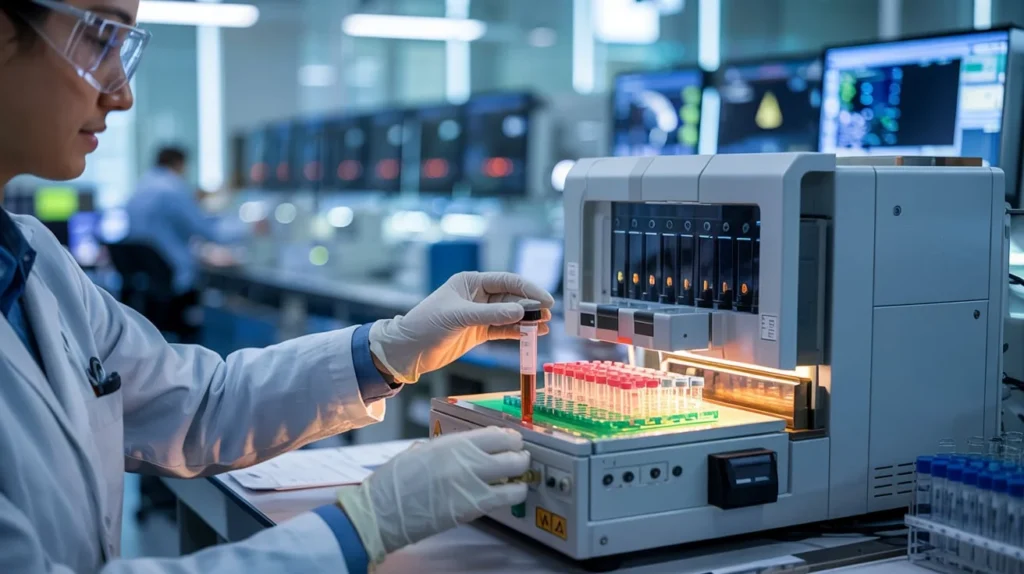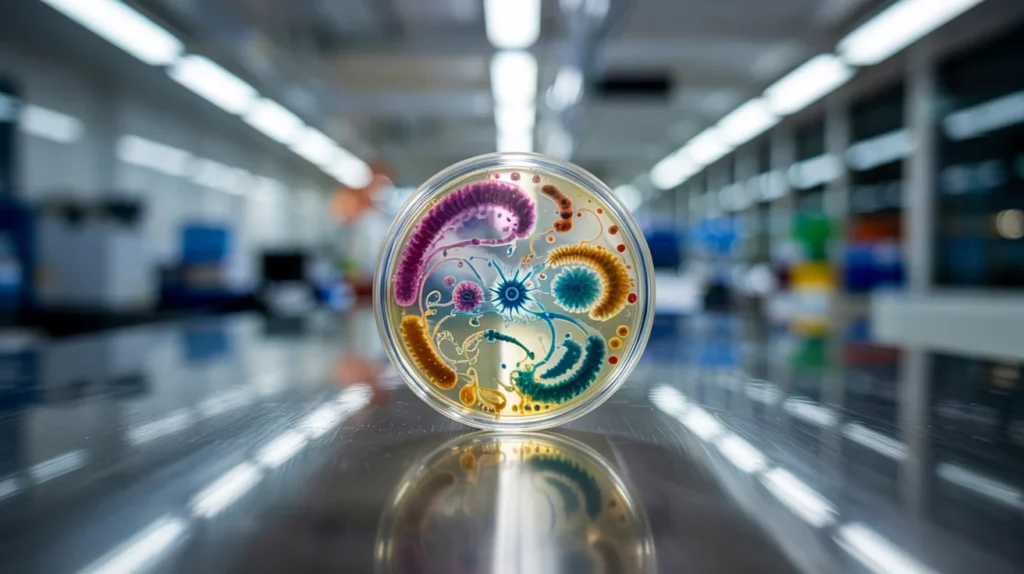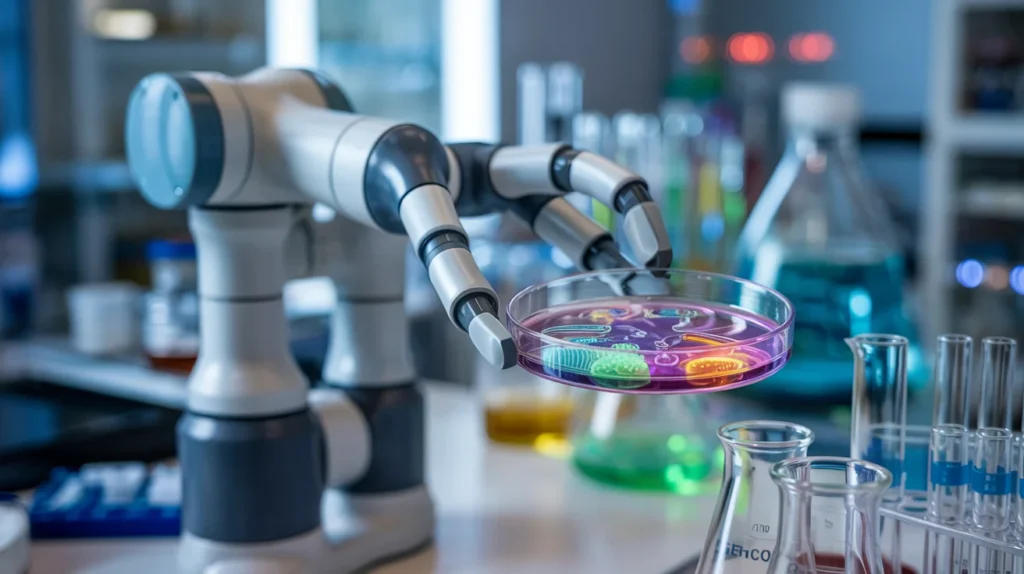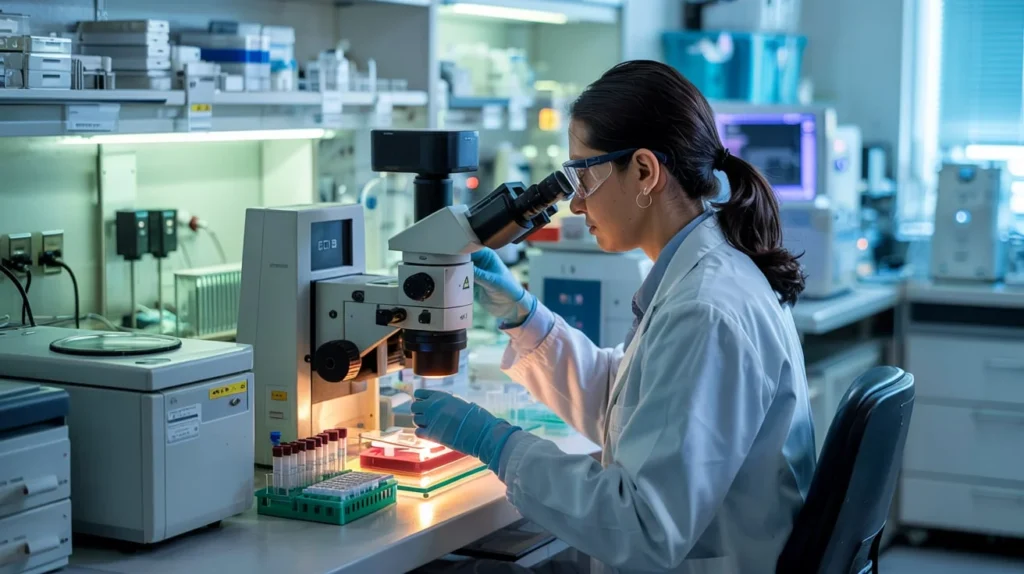Medical laboratory technology is one of the most vital pillars of modern healthcare. It connects science with medicine by providing accurate test results that guide doctors in diagnosing and treating patients. Without it, even the most skilled physicians would face challenges in making reliable medical decisions.
At the same time, Diagnostic Laboratory Technology is not limited to basic blood or urine tests. It includes advanced fields such as microbiology, pathology, molecular diagnostics, and genetic testing. Through these specializations, technologists help detect infections, monitor chronic conditions, and even predict potential health risks before they become serious.
Furthermore, this field continues to grow as technology evolves. Automation, artificial intelligence, and digital tools are transforming laboratories worldwide. As a result, patients receive faster, safer, and more precise outcomes. This makes Laboratory Healthcare Science not only essential today but also a driving force for the future of healthcare.
What Is Medical Laboratory Technology?
Medical laboratory technology is the branch of healthcare science that deals with the testing, analysis, and evaluation of body fluids, tissues, and cells. These tests provide crucial information that helps doctors diagnose diseases, plan treatments, and monitor patient health. It acts as the foundation of evidence-based medicine, ensuring that medical decisions are accurate and reliable.
In addition, Laboratory Healthcare Science covers a wide range of disciplines, including hematology, microbiology, clinical chemistry, immunology, and molecular biology. Professionals in this field, known as medical laboratory technologists or technicians, work behind the scenes but play a central role in patient care. Their expertise ensures that illnesses are detected early and treatments are guided with precision.
Role of Lab Technologists in Diagnosis
Medical laboratory technologists are vital to accurate diagnosis and treatment. They perform detailed tests on blood, urine, tissues, and other samples to detect abnormalities. Their work provides doctors with precise data to confirm diseases, track health progress, and monitor the effectiveness of treatments. Without their expertise, many medical conditions would go unnoticed until advanced stages.
Key Contributions of Lab Technologists
- Conducting diagnostic tests for infections and chronic diseases
- Ensuring the accuracy and reliability of laboratory results
- Supporting early detection of life-threatening conditions
- Assisting doctors in tailoring treatment plans
- Monitoring patient response to ongoing therapies
Training and Certification Pathways

A career in Diagnostic Laboratory Technology requires both formal education and practical training. Most professionals start with a diploma or bachelor’s degree in medical laboratory science, clinical laboratory technology, or a related healthcare field.
These programs combine classroom learning with laboratory practice, ensuring that students gain the scientific knowledge and technical skills needed for accurate testing. During their training, students also complete internships or clinical rotations, which give them hands-on experience in real healthcare settings.
After completing academic requirements, certification becomes the next important step. Many countries require technologists to be licensed or certified by professional bodies such as the American Society for Clinical Pathology (ASCP) or similar organizations. These certifications validate professional competence and open doors to better career opportunities. In addition, continuing education is encouraged, as laboratory technology is constantly evolving with new tools, techniques, and regulations.
Job Market Insights and Salary Trends
The demand for medical laboratory technologists is steadily increasing as healthcare systems expand and new diseases emerge. Hospitals, clinics, and research centers rely on skilled professionals who can deliver accurate results under strict timelines. According to recent labor statistics, the field offers competitive salaries and stable career growth, making it an attractive option for healthcare professionals. The profession also provides diverse opportunities worldwide, as laboratory expertise is essential in every region.
Key Job Market Highlights
- Median annual salary is around $61,000 in the United States
- Projected job growth of about 2% over the next decade
- Approximately 22,000 new job openings are expected each year
- High demand in hospitals, private labs, and research institutions
- Opportunities for career advancement in specialized laboratory fields
Top Educational Institutions

Pursuing education in medical laboratory from a recognized institution provides strong career opportunities. Some universities are well-known for their advanced programs, experienced faculty, and strong clinical training. These institutions not only prepare students with knowledge but also connect them with practical experience in modern laboratories.
Loma Linda University
Loma Linda University in California is one of the leading institutions offering programs in medical laboratory science. It is known for its holistic approach to healthcare education and its focus on clinical excellence. Students benefit from direct exposure to hospital labs and advanced diagnostic methods.
University of Texas Medical Branch (UTMB)
The University of Texas Medical Branch provides high-quality education in laboratory sciences with strong research facilities. UTMB’s program emphasizes practical skills and advanced laboratory training. Graduates are well-prepared for careers in both clinical and research settings.
George Washington University
George Washington University offers a respected medical laboratory science program with a strong focus on molecular diagnostics and advanced testing techniques. The institution combines academic knowledge with clinical training opportunities in Washington, D.C., making it highly attractive for students seeking professional growth.
Technological Advances in the Lab
Medical lab technology has transformed rapidly with the rise of automation, artificial intelligence, and molecular testing. Modern laboratories now use advanced analyzers, robotics, and digital pathology systems to deliver faster and more accurate results.
These innovations reduce human error, improve efficiency, and allow early disease detection. Point-of-care testing has also become more common, giving patients access to immediate results in clinics or even at home. Together, these advancements ensure that laboratories remain at the heart of precision medicine and future healthcare.
Career Paths and Specializations
Medical laboratory tech provides a wide variety of career paths for professionals who want to explore specialized areas of healthcare. Hematology technologists, for example, focus on blood testing and help identify disorders like leukemia, clotting issues, and anemia. Cytotechnologists work with cell samples to detect cancerous changes at an early stage, which plays a vital role in saving lives.
These roles demand accuracy, focus, and strong scientific knowledge. In addition, opportunities exist in molecular diagnostics, where technologists analyze genetic material to detect inherited conditions and guide precision therapies.
Laboratory professionals can also move into supervisory roles, overseeing teams, ensuring quality standards, and implementing new technologies. This diversity allows professionals to shape their careers according to their interests while contributing significantly to patient care.
Challenges Facing the Field

Medical lab technology, though essential, faces many challenges that directly affect professionals and healthcare services. A major issue is the shortage of skilled technologists, which increases workloads and creates pressure for faster results.
Continuous regulatory updates also require ongoing training, making it difficult for many to keep up. Burnout is another common problem due to long hours and strict deadlines, while limited funding in some facilities prevents access to advanced equipment. These challenges can reduce efficiency but also highlight the resilience and dedication of laboratory professionals who remain committed to patient care.
Key Challenges in the Field
- Shortage of qualified technologists leading to heavy workloads
- Frequent regulatory updates require ongoing training
- Burnout caused by long shifts and high pressure
- Limited funding is restricting access to modern lab tools
- Efficiency gaps in under-resourced healthcare systems
Global Perspective and Professional Bodies
Medical lab technology operates within a global framework guided by professional organizations that set standards and encourage collaboration. The Association for Diagnostics & Laboratory Medicine (ADLM) plays a significant role in supporting laboratories through education, innovation, and policy development. Similarly, the International Federation of Clinical Chemistry and Laboratory Medicine (IFCC) provides guidelines that ensure laboratory practices remain consistent and reliable worldwide. These organizations enhance the credibility of the profession and build trust in diagnostic testing.
Furthermore, such global bodies offer training, certifications, and research opportunities for laboratory professionals. They create platforms for knowledge exchange between countries, helping laboratories adapt to international standards. Through their work, medical laboratory technologists continually evolve, ensuring accuracy and quality across diverse healthcare systems.
Conclusion
Medical laboratory technology is more than just running tests; it is the foundation of accurate diagnosis and effective treatment. By combining science, technology, and skilled professionals, this field ensures that doctors have the reliable data they need to make life-saving decisions. Its contributions often remain behind the scenes, yet they directly impact every patient’s health journey.
As healthcare continues to evolve, the role of medical lab technology will only grow stronger. With advancements like automation, molecular diagnostics, and personalized medicine, it promises a future where diseases are detected earlier and treated more precisely. This field stands as a vital link between science and healing, shaping a healthier tomorrow for communities worldwide.

